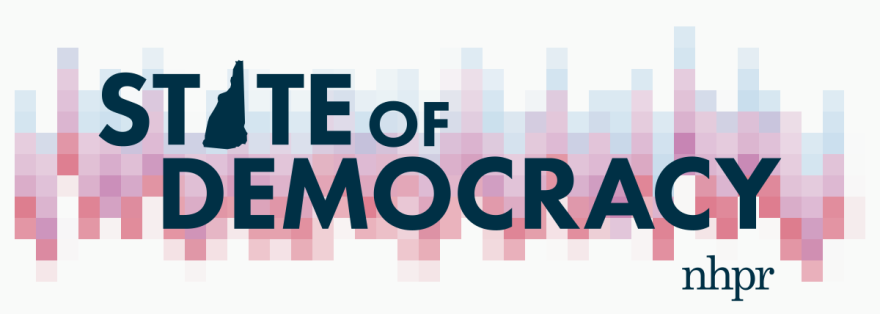Here's a question: Which New Hampshire community is the best bellwether for the statewide political climate? It's not an old industrial city, or a Seacoast suburb, or a lakeside resort town. It's actually the tiny Coos County village of Shelburne.
The recent presidential primary is an example: Shelburne's vote tallies matched the statewide results nearly perfectly, better than any other town. In fact, Shelburne has mirrored the statewide result in every election for the past decade. NHPR’s Sean Hurley visited the rural village to find out what makes Shelburne's politics so ... New Hampshire-y.

Shelburne is a valley town, population 372 - a perfect postage stamp on the border with Maine. Mountain ranges hold it north and south, and the Androscoggin River splits across its middle. There are no stores or gas stations, not a single traffic light in Shelburne.
“The last dairy cow went out of Shelburne about 10 years ago,” Ann Leger says, “and over in the fields over there you'd see a couple of horses and a donkey but pretty much it is a residential community now where most people work in Berlin or Gorham.”
When I show her the numbers from this year’s presidential primary, how Shelburne voted almost identical to the state as a whole,Leger doesn’t seem surprised. She can see a lot of similarities between the two.
The state, for example, has been grappling with the controversial power line project Northern Pass for years.
In Shelburne, Leger says, things aren’t much different. Property rights have been a big issue here in recent years: “Because from this foothill to that foothill across the river is less than half a mile; and we have telephone, electrical, North Road, two oil lines, a gas line, the river, Route 2, the railroad and two more lines over it. And every time somebody wants to come through they want to come through here, because we're one of the only east-west valleys available.”

When Leger grew up here in the 1940s,Shelburne was a place of farms and “people of the land” as she calls them. Not anymore – a shift she suspects might be found in the state at large.
“You know it used to be that we would vote a 100 percent Republican,” she says. “I don't know what the figures are but there are a lot more Democrats voting in Shelburne now.”

Jo Carpenter at Shelburne Town Hall has those numbers. 90 Republicans and 68 Democrats. But she calls my attention to the undeclared voters: at 162, they're the biggest bloc by far.
"You never know what they're going to do," Carpenter says. "Makes it interesting.”
As with the rest of the state, those independent voters increasingly have the biggest say at the ballot box in Shelburne. But Carpenter also has a theory why Shelburne’s primary vote so closely matched up with the state.
“So we have the people that have lived here forever, which I think you have in New Hampshire,” she says. “We have the people that have moved in say, 30 or 40 years ago - there was a big influx at that time. Which is sort of like New Hampshire. And then we have a lot of retirees and older folks which I think New Hampshire is an aging state.”

Population-wise at least, she says, Shelburne is like a little version of New Hampshire: “Even though, I mean, we're very small, yeah I think we do mirror that.”
Carpenter suggests that if I really want to get to know Shelburne and what the town is thinking about the upcoming election, there’s one place I need to go. ”Tomorrow morning is our transfer station day," she says.

So the next morning, I’m at the dump with the people of Shelburne.
“This is the social center of the town. This is Dumpin' Donuts!” 84-year-old John Gralenski says with a laugh. A former selectman, he’s lived in Shelburne for 40 years. “Donuts and coffee for the adults, lollipops for the kids and bones for the dog.”
Ken Simonoko, who manages the transfer station, says Dumpin' Donuts has been going on since the 1970’s. Before that, he says, Dumpin' Donuts wasn’t possible because residents used to throw their trash off the bridge.
Silver-haired Dick Lussier – tall, tan, hiker, staunch Republican – grabs a donut and takes a seat.
“It is the town communication spot,” Lussier says. “You want to know what's going on, you come in here and you sit down and you find out who's doing what, what's going on in the town.”

A popular topic of conversation at Dumpin' Donuts in recent months, Lussier says, is this year’s presidential campaign. Though he didn’t think much of Donald Trump early on and voted for Marco Rubio in the Republican Primary, he says he’ll be voting for Trump in November.
“I thought he was a nut,” Lussier says, “and I still think he's quirky but I like his policies better than Hillary Clinton.”
John Gralenski voted for Bernie Sanders in the Democratic Primary and jokes that he might vote for his dog on Election Day.
“I had a nightmare months ago that it was election day and I had to choose between Hillary and Trump," he says. "Looks like that's what's going to happen.”
Ken Simonoko shakes his head in disgust, “Think about this. Out of 320 million people in this country, is that the best they can come up with? Hillary, Sanders, Trump?”
Simonoko says he’ll be voting for Trump but he thinks Clinton will probably be the next president.
“Well, if Hillary gets in I'm set, because I'll get on those programs,” Simonoko says.
“How about if Bernie's vice president?” Lauser proposes.
“Ooh, then I'm good!” Simonoko says.
“That means we get free donuts!” Lauser says.
“Everything free!” Simonoko says.
What they say at the dump in Shelburne, you could overhear anywhere across the state -- at least until Election Day.






